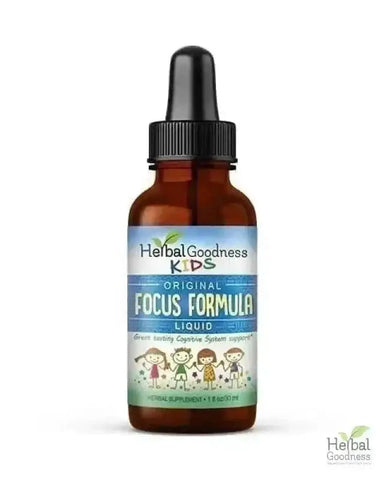Top 5 Superfoods to Boost Your Kids’ Memory | Herbal Goodness
For any parent, their kids are a priority. We want them to excel and shine at whatever they do. Most times, we spare no expense in seeing that we help that dream or desire happen. And the truth is, at this stage of their lives, our kids need all the help and support they can get.
When a child is born, the brain size is only about a quarter of its eventual adult size, and by age two, it reaches 3/4th of adult size. And by five, the brain will be very close to adult size and volume.¹ 90% of a child’s brain development happens in the first six years of life. it means the structures of the brain involved in learning, memory, motor control, and every other brain function are established by the age of six. The brain is a very hungry organ, the first of the body's organs to absorb nutrients from the food we eat.² The food a child eat plays an important role in keeping their brain healthy and making them bloom into a happy and successful adult.
Now, school is back in session and you can't help but think about superfoods that can help boost your kids’ concentration and understanding at school. In addition to fruits and vegetables, what other superfoods can we give our children to optimize their chances of having an amazing day at school?
-
Oily Fish
Research has shown that people who consume a diet rich in these fatty acids might have sharper memories and do better in mental skills tests. Fish rich in omega-3 fatty acids such as DHA and EPA are essential foods for healthy brain growth and function. Around 60% of the brain is fat, so your body uses omega-3 fatty acids to assist in neurological development, and protect the brain from memory loss and declining memory function.³ Salmon, mackerel, fresh tuna, trout, sardines, and herring are great sources of omega-3 oils and should be eaten once a week. Make salmon sandwiches (on whole wheat bread) instead of tuna for a healthy alternative.⁴
-
Beans
Beans are special because they have energy from protein, complex carbs, fiber as well as lots of vitamins and minerals. These are excellent brain food since they keep a child's energy and thinking level at peak all afternoon if they enjoy them with lunch. Kidney and pinto beans contain more omega-3 fats than other beans which we know are important for brain growth and function. Sprinkle beans over salad and top with salsa. Mash vegetarian beans and spread them on a tortilla. Mash or fill a pita pocket with beans, add shredded lettuce and low-fat cheese. Add beans to spaghetti sauce and salsa. Infants love mashed beans with applesauce!²
-
Eggs
Choline, found in egg yolks, is a key component of cell membranes that the body uses to create important neurotransmitters and cell membrane signaling. It has been shown to play a significant role in the brain development of a fetus or infant. Studies have shown that choline improves mental function and memory development. Eggs are also high in protein and contain iron, folate, and vitamin A – all of which are important for the growth, repair, and development of cells. Unless your kids have an allergy to eggs, encouraging them to consume them regularly won't be a bad idea. Send your child off to school with a grab-and-go breakfast egg burrito. Try breakfast for dinner one night a week, scrambled eggs, and toast.
-
Fruits and Vegetables
Now here is where a challenge resides; getting your kids to eat those veggies. But creativity will come to your aid here. Green leafy vegetables like spinach, kale, and lettuce contain brain-protecting compounds, including folate, flavonoids, carotenoids, and vitamins E and K1. Tomatoes, sweet potatoes, pumpkin, carrots, vegetables with rich, deep colors are the best sources of antioxidants that keep brain cells strong and healthy.² Fruits, especially berries, are rich sources of antioxidants. Berries contain anthocyanins and other flavonoids, which have been shown to have antioxidant properties. Eating a diet rich in antioxidant foods can therefore help combat mental decline. Fruits that are high in vitamin C, such as oranges, kiwi fruit, guava, strawberries, and papaya can be a great choice for keeping your kid’s brain healthy and alert. Studies show that vitamin C in fruits has the potential to protect against mental decline and support brain health. It is also another antioxidant that prevents damage caused by free radicals and keeps brain cells strong.³
-
Oats, Cereals, and Whole grains
Oats are very good for brain development because they provide excellent energy for the brain that kids need first thing in the morning. Loaded with fiber, oats keep a child’s brain energetic. They are also good sources of vitamin E, B-vitamins, potassium, and zinc that make the brain function. Packed with carbohydrates, whole grains provide essential glucose and energy to fuel the brain. They are also full of B-vitamins, which nourish a healthy nervous system. Numerous studies have shown that a breakfast filled with whole grains improves short-term memory and attention when compared with refined carbohydrates or no morning meal at all. Whole grains are found in oats, granary bread, rye, wild rice, quinoa, and buckwheat. Wholegrain foods are also high in fiber, which regulates glucose supply into the body.⁴
Related: Need More Sleep? Improving Your Sleeping Pattern with Guava Leaf Tea | Herbal Goodness
A healthy, balanced diet is critical for your child’s overall health, including their brain health. Incorporating the foods listed above into your child’s diet will help provide the nutrients they need for their brain to develop and function at its best.
🌿 Give Your Kids a Focus Boost Naturally
At Herbal Goodness, we know parents want their kids to stay sharp and focused at school. That’s why we created the Kids Focus Formula – 1oz, a gentle, plant-based supplement designed to support children’s concentration and calm focus naturally.
✨ Plant-based and safe for kids
✨ Supports focus and attention
✨ Easy-to-use liquid formula
Set your child up for success this school year.
👉 Shop Kids Focus Formula Today
Reference
- www.flintobox.com/blog/nutrition/brain-development-food-kids.Top 11 Brain Development Food To Make Your Child Healthy. Accessed on July 25, 2021.
- www.webmd.com/parenting/features/brain-foods-for-children. Top 10 Brain Foods for Children. Accessed on July 25, 2021
- https://www.mountelizabeth.com.sg/healthplus/article/brain-foods-kids. 7 Brain-Boosting Foods for Children. February 14, 2019.
- https://www.onhealth.com/content/1/kids_brain_foods. Brain Foods: Healthy Food for Kids' Brains. Accessed on May 20, 2021.
Related: 5 Natural Immune System Boosters for Kids | Herbal Goodness
ii Herbal Goodness Kids Line: Nurturing Young Minds and Bodies Naturally













